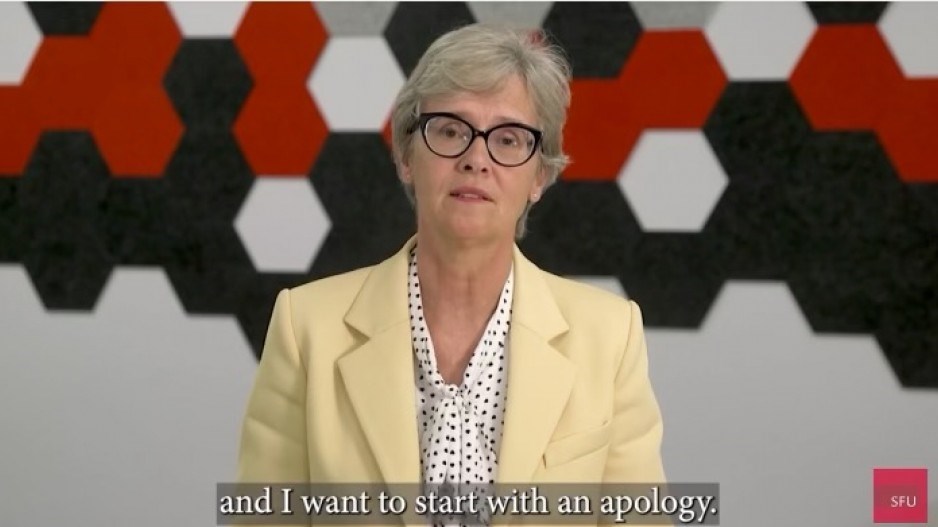A B.C. Supreme Court judge refused Thursday to order Simon Fraser University to reverse its decision to cancel the university’s football program.
Players Gideone Kremler, Kimo Hiu, Andrew Lirag, Ryan Barthelson and Dayton Ingenhaag had petitioned the court for an injunction, which was heard on May 1.
But Justice Michael Stephens said their lawyer, Peter Gall, failed to satisfy legal requirements.
“The court is cognizant of the plaintiffs’ understandable deep disappointment at SFU’s termination of the football program,” Stephens wrote. “This court does not trivialize the hardship they feel from the cancellation of the football program and associated cancellation of the upcoming football season.”
The players alleged binding contracts existed with SFU, to provide both education and the football team on which they played.
“The plaintiffs further contend that it was an implied term of the alleged recruitment contracts that SFU would give reasonable notice of the university’s decision to eliminate the football program, and that it failed to do so,” Stephens wrote.
“The plaintiffs provide no previous case authority where a student has successfully established that an oral contract existed with a university that contractually committed the university to provide reasonable notice of the termination of a varsity sport program – despite the cost or risks to the university of running such a program, nor the potential impact on student athletes.”
Since 2010, the 1965-established team had played in NCAA Division II. In 2022, the Red Leafs were 1-8 in their first year in the Texas-based Lone Star Conference, which decided in January that SFU would not be invited back in 2024. SFU also lost in the Shrum Bowl to the University of B.C. Thunderbirds.
SFU announced on April 4 its decision to cancel the football program.
Athletic director Theresa Hanson’s affidavit said SFU considered other avenues to play in 2023. Two other NCAA Division II conferences were not accepting new members and playing as an independent was not feasible, nor was going to Division III, which does not permit scholarships.
Hanson also swore that SFU contacted the National Association of Intercollegiate Athletics and U Sports, but “concluded SFU did not meet the membership requirements of the NAIA or U Sports bylaws.” She claimed that the university did not have confidence in safely and effectively running a team in 2023.
Gall told the court that SFU should be ordered to have a football season, by reinstating coaches and trying to find a new conference or an alternative schedule.
“The plaintiffs contend it would be just, reasonable, and equitable in all the circumstances to order SFU to, in good faith, do so,” Stephens wrote.
However, he ruled that there is a high bar to obtain a mandatory injunction and the players’ lawyer fell short.
“What is sought here by the plaintiffs is a mandatory injunction that would, in effect, order SFU to reinstate and run a currently cancelled varsity program. The plaintiffs have failed to satisfy the legal requirements under governing case authorities, including the test of strong prima facie [self-evident] legal merit, and they have not satisfied the Court that a mandatory injunction is available at law, just, and appropriate in the circumstances.”
Stephens departed from standard practice and ordered each side in the dispute to pay their own costs.
“The court is cognizant of the plaintiffs’ understandable deep disappointment at SFU’s termination of the football program,” Stephens wrote. “This court does not trivialize the hardship they feel from the cancellation of the football program and associated cancellation of the upcoming football season.”
In a video message produced before the court verdict, but published midday, SFU president Joy Johnson apologized.
“I’m sorry about the impact and stress that the end of our NCAA football program has caused for those affected, especially football student-athletes, staff and alumni,” said Johnson, who has said little about the controversy since the April 4 announcement.
She also said what hasn’t changed is that SFU has no place to play in the NCAA.
"There are challenges to address and we want to find a solution together,” she said, in announcing the hiring of special advisor Bob Copeland to determine if, when and how to resurrect football at SFU.”
Copeland and McLaren Global Sport Solutions will work with student-athletes, staff, the SFU Football Alumni Society, and others to explore options for football on Burnaby Mountain.
“The work begins immediately, Mr. Copeland, along with McLaren CEO, Richard McLaren, will be at SFU next week to convene preliminary meetings,” said the SFU announcement.
McLaren is a University of Western Ontario sports law professor known internationally for investigating state-sponsored doping at the Sochi 2014 Winter Olympics. Copeland is the former associate vice-president at the University of Waterloo, where he was also director of athletics.
Terms of reference include exploring whether to restart the football team and whether it should join U-Sports, NAIA or another organization. A final report will be ready in September.




